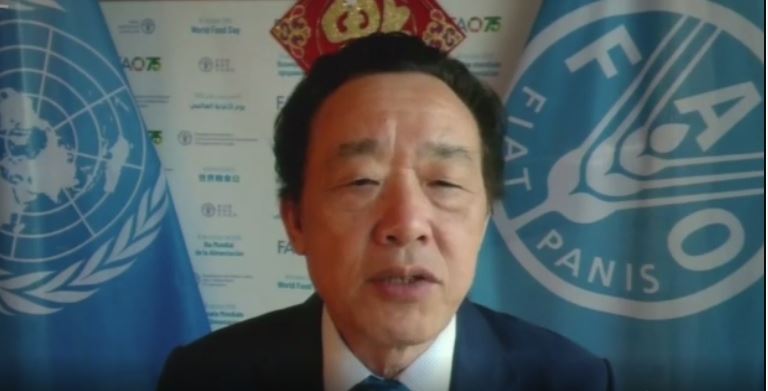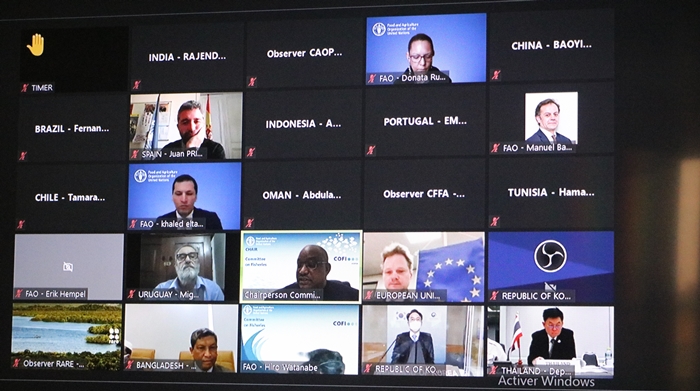The 34th session of the FAO Committee on Fisheries (COFI 34) held from 1 to 5 February 2021 in virtual mode, in view of the COVID-19 pandemic. COFI was created in 1965, during the 13th session of the FAO Conference, and is a subsidiary body of the Council of the Food and Agriculture Organization of the United Nations (FAO).
 At the opening of the 34th session of the FAO Committee on Fisheries (COFI), the General Director of FAO said that fisheries and aquaculture are of crucial importance for global food security. Mr QU Dongyu noted that the COVID-19 pandemic has affected the fisheries and aquaculture sector due to consumer demand changes, market access and logistical issues related to transport and border restrictions. He also underlined that fisheries and aquaculture are essential for the global economy to better recover from the COVID-19 crisis.
At the opening of the 34th session of the FAO Committee on Fisheries (COFI), the General Director of FAO said that fisheries and aquaculture are of crucial importance for global food security. Mr QU Dongyu noted that the COVID-19 pandemic has affected the fisheries and aquaculture sector due to consumer demand changes, market access and logistical issues related to transport and border restrictions. He also underlined that fisheries and aquaculture are essential for the global economy to better recover from the COVID-19 crisis.
“The fisheries and aquaculture sector has a crucial contribution to make in the top four: better production, better nutrition, a better environment and a better life. The potential of modern aquaculture to develop and feed the world is extraordinary,” said Qu. According to FAO, 10 percent of the world’s population depends on the fisheries and aquaculture sector for their livelihoods, mainly small producers who need support.
 The General Director invited FAO members to use COFI 34 to discuss how the production, processing, trade and consumption of aquatic foods can be processed as part of a broader change in agri-food systems, to make them more sustainable, resilient and inclusive.
The General Director invited FAO members to use COFI 34 to discuss how the production, processing, trade and consumption of aquatic foods can be processed as part of a broader change in agri-food systems, to make them more sustainable, resilient and inclusive.
“We know that the land alone will not feed us with an abundance and diversity of food – we need Blue Processing to ensure Blue Food production,” he added, underlining the importance of modernizing traditional fishing methods with innovative approaches and digital technologies.
The FAO Director said: “Combining fishing with tourism and educational activities is a way of keeping the cultural heritage alive and creating new values and employment opportunities”.
Finally, he stressed the importance of fish in food, especially for pregnant women and children, and in the fight against all forms of malnutrition. “Fish should be promoted in food and nutrition strategies throughout the world”, recommended Mr QU.
25th anniversary of the FAO Code of Conduct
FAO Code of Conduct for Responsible Fisheries turned 25 last year. It was adopted by the FAO Conference in 1995, a landmark instrument that has guided efforts towards sustainable fisheries and aquaculture around the world.
The Code’s anniversary comes at a difficult time as pollution, climate change; biodiversity loss, unregulated practices and increased competition for the use of marine and coastal areas threaten aquatic ecosystems and their resources. FAO reports that 34.2 percent of all marine fish stocks are caught beyond sustainable biological limits, a threefold increase since surveillance began in 1974.
SOFIA 2020 Report, a bi-annual FAO report on the state of world fisheries and aquaculture, estimates that total fish production is expected to increase to 204 million tons in 2030, up 15 percent from 2018, with aquaculture’s share increasing from its current 46 percent. Aquaculture is the fastest growing food production sector in the world over the past 50 years, with an average growth rate of 5.3 percent per year since the turn of the century.
Mamadou Aliou Diallo


